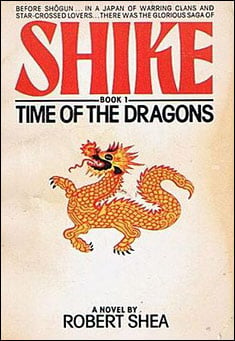Beautiful young Taniko struggles under oppression as the mistress of the cruel Kublai Khan, and Jebu, a young monk, is transformed into a fierce warrior, in a saga of the ancient Orient during a time of bloodshed and magic. The over-all story is about how Jebu and Taniko are forced onto opposing sides of a civil war, and Taniko's growth as a woman whose fate moves her from one powerful man to another, eventually becoming grandmother to a shogun.
The story also focusses on the contrast of hypocrisies between the noble class and warrior class. The nobles consider samurai beneath them but act in many of the barbarous ways that they accuse them of, and the samurai are presented as ruffians of shifting loyalties, despite considering themselves to be genteel and worldly. Source: wikipedia.
Excerpt:
Jebu felt himself being lifted by many hands. They stood him on his feet and rubbed him with warm blankets. Shivering still, he tried to fight off those who helped him. He must get back into the water-filled stone coffin until the Father Abbot called him.
“Jebu, awake.” It was the voice of Taitaro. Jebu was standing in the crypt, facing Taitaro. Behind Taitaro were the ninety-nine stone urns, and on either side of him stood Weicho and Fudo and the two monks who had brought Jebu into the crypt. Would he ever stop shivering?
“Come upstairs, Jebu,” said Taitaro. “You can stand beside a brazier until you are warm again.”
Wrapped in a heavy robe, Jebu stumbled up the stone steps on legs that almost refused to move, a monk supporting him on either side. Taitaro led the way. They bundled Jebu back into the main hall of the temple and led him to a pile of cushions beside a charcoal brazier. He sat facing Taitaro in front of the altar. All the monks of the chapter sat cross-legged on the floor, in rows, their grey hoods pulled over their heads. The temple was still lit by candles set in bronze lamps suspended from the ceiling. The sun had not yet risen.
“Tell me everything that happened during the night,” said Taitaro.
Jebu began his account, not with his visit from Taitaro, but what happened between himself and Weicho and Fudo. The two sat grinning at him with infuriating audacity when he looked accusingly at them. Jebu went on to tell of his journey on the back of the white dragon and his encounter with the giant.
Taitaro said, “If you see an animal or bird in your initiation vision, it means that animal or bird has adopted you as its own. There is no kami more wise and powerful and fortunate than the kami of dragons. That you rode a white dragon suggests that your future may be bound up with that of the Muratomo clan, whose crest is the White Dragon.”
“But what of the giant?” said Jebu.
“As you describe him, he could be either your father or your father’s slayer, but there is nothing in the vision to suggest that he is either one. He is most certainly one of your father’s countrymen. He must be a powerful spirit. That is why you saw him as a giant.” Taitaro smiled. “It may require the rest of your life for you to unravel fully the meanings of what you have heard and seen this night. You have experienced an authentic vision and, I believe, achieved authentic insight.
I welcome you into the ranks of the Zinja. Bring him the robe of a brother of the Order.”
Joy flooded through Jebu like the golden sunlight that had bathed the desert in his vision. The wings of the dragon he had seen in that vision suddenly seemed to be his. Still seated on the cushions, his eyes fixed on Taitaro, he soared inwardly. He had passed the testing, and he had at last the prize he had worked for since early childhood.
A monk stepped forward with a grey robe draped over his outstretched arms. Jebu looked beyond him and saw the sapphire light of morning through the open doorway of the temple. The monk helped Jebu pull the grey robe on over his head. The Zinja robe was really more of a tunic, stopping just below the knees. The sleeves came halfway down the forearms. On the left side of the robe was sewn a circular patch of white silk on which a willow tree was embroidered in blue thread. It seemed a simple garment, but it was lined with hidden pockets to accommodate a variety of Zinja weapons and tools. A strip of grey cloth belted the robe. Jebu tied the ends of the belt in the intricate world-serpent knot that the Zinja always used for this purpose. He pulled the hood of the robe over his head.
“Beyond this robe, you need possess nothing,” said Taitaro.
In unison the monks chanted, “The grey is all colours. The cloth is all matter. The Willow Tree is all time.”
Taitaro said, “Bring him the bow and arrow of the Zinja.” Another monk stepped forward with the short, powerful, double-curved compound bow which the Order had been using for centuries, and a cloth quiver containing twenty-three arrows with various heads-willow leaf, turnip head, frog crotch, armour piercer and bowel raker. The monk slung the bow and quiver over Jebu’s left shoulder. Glancing at the temple door, Jebu saw that the light in the sky was almost white.
“You are warrior as well as monk, monk as well as warrior,” said Taitaro. “Take the bow and arrow with reluctance. Use the bow with dread. Grieve for those who fall to your arrows. But make every arrow count.”








